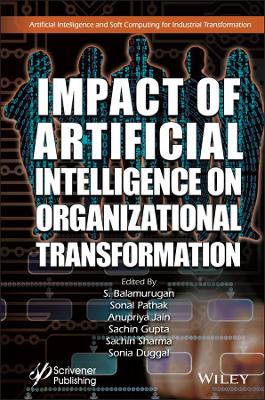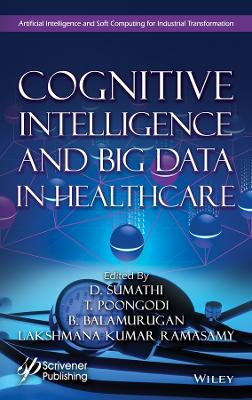Artificial Intelligence and Soft Computing for Industrial Transformation
6 total works
Deep Learning Application in Image Processing
by Neeraj Kumar, S. Balamurugan, Karthikeyan N, Sivakumar M, and Dinesh Goyal
Impact of Artificial Intelligence on Organizational Transformation
by S. Balamurugan, Sonal Pathak, Anupriya Jain, Sachin Sharma, Sonia Duggal, and Sachin Gupta
Discusses the impact of AI on organizational transformation which is a mix of computational techniques and management practices, with in-depth analysis about the role of automation & data management, and strategic management in relation to human capital, procurement & production, finance, and marketing.
The impact of AI in restructuring organizational processes is a combination of management practices and computational technology. This book covers the areas like artificial intelligence & its impact on professions, as well as machine learning algorithms and technologies. The context of applications of AI in business process innovation primarily includes new business models, AI readiness and maturity at the organizational, technological, financial, and cultural levels. The book has extensive details on machine learning and the applications such as robotics, blockchain, Internet of Things. Also discussed are the influence of AI on financial strategies and policies, human skills & values, procurement innovation, production innovation, AI in marketing & sales platforms.
Audience
Readers include those working in artificial intelligence, business management studies, technology engineers, senior executives, and human resource managers in all types of business.
Materials for Solar Energy Conversion
by R. Anandan, G Suseendran, S. Balamurugan, Ashish Mishra, and D. Balaganesh
This book provides professionals and students with a resource on the basic principles and applications of solar energy materials and processes, as well as practicing engineers who want to understand how functional materials operate in solar energy conversion systems.
The demand for energy is increasing daily, and the development of sustainable power generation is a critical issue. In order to overcome the energy demand, power generation through solar energy is booming. Many research works have attempted to enhance the efficiency of collection and storage of solar energy and, as a result, numerous advanced functional materials have been developed for enhancing the performance of solar cells.
This book has compiled and broadly explores the latest developments of materials, methods, and applications of solar energy. The book is divided into 2 parts, in which the first part deals with solar cell fundamentals and emerging categories, and the latter part deals with materials, methods, and applications in order to fill the gap between existing technologies and practical requirements. The book presents detailed chapters including organic, inorganic, coating materials, and collectors. The use of modern computer simulation techniques, conversion and storage processes are effectively covered. Topics such as nanostructured solar cells, battery materials, etc. are included in this book as well.
Audience The book is aimed at researchers in materials science, chemistry, physics, electrical and mechanical engineering working in the fields of nanotechnology, photovoltaic device technology, and solar energy.
Cognitive Intelligence and Big Data in Healthcare
by D. Sumathi, T. Poongodi, S. Balamurugan, and R. Lakshmana Kumar
As health is the foremost factor affecting the quality of human life, it is necessary to understand how the human body is functioning by processing health data obtained from various sources more quickly. Since an enormous amount of data is generated during data processing, a cognitive computing system could be applied to provide responses to queries, thereby providing assistance in customizing intelligent recommendations. This decision-making process could be improved by the deployment of cognitive computing techniques in healthcare, allowing for cutting-edge techniques to be integrated into healthcare in order to provide intelligent services in various healthcare applications.
This book provides diversified topics in the healthcare sector and shows the range of recent innovative research, in addition to shedding light on future directions in this area.
Advanced Healthcare Systems
by Rohit Tanwar, S. Balamurugan, Rakesh Kumar Saini, Vishal Bharti, and Prem Kumar Chithaluru
This book offers a complete package involving the incubation of machine learning, AI, and IoT in healthcare that is beneficial for researchers, healthcare professionals, scientists, and technologists.
The applications and challenges of machine learning and artificial intelligence in the Internet of Things (IoT) for healthcare applications are comprehensively covered in this book.
IoT generates big data of varying data quality; intelligent processing and analysis of this big data are the keys to developing smart IoT applications, thereby making space for machine learning (ML) applications. Due to its computational tools that can substitute for human intelligence in the performance of certain tasks, artificial intelligence (AI) makes it possible for machines to learn from experience, adjust to new inputs and perform human-like tasks. Since IoT platforms provide an interface to gather data from various devices, they can easily be deployed into AI/ML systems. The value of AI in this context is its ability to quickly mesh insights from data and automatically identify patterns and detect anomalies in the data that smart sensors and devices generate—information such as temperature, pressure, humidity, air quality, vibration, and sound—that can be really helpful to rapid diagnosis.
Audience
This book will be of interest to researchers in artificial intelligence, the Internet of Things, machine learning as well as information technologists working in the healthcare sector.


